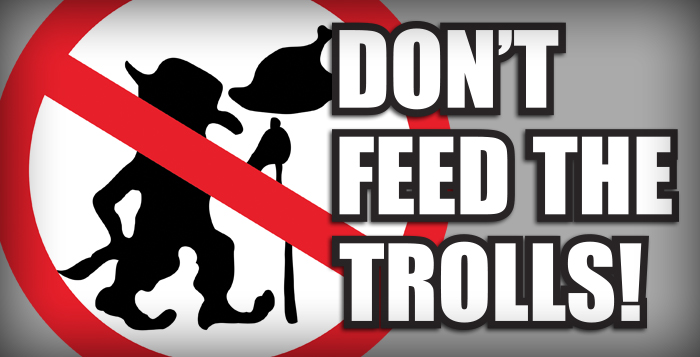According to Wikipedia, a “troll” is a person who sows discord on the Internet by starting arguments or upsetting people, by posting inflamatory, extraneous, or off-topic messages in an online community with the deliberate intent of provoking readers into an emotional response or otherwise disrupting normal on-topic conversation.
Notice the word “deliberate intent” in the above definition. Having a contrary, disagreeable opinion isn’t – by definition – “trolling.” Being a complainer or a “Negative Nancy” doesn’t make one a troll. Being argumentative doesn’t make one a troll, necessarily. People with real concerns and real facts to present on real issues are often maligned as trolls by their ideological opponents because they’re well…negative. But in truth, it’s the intention to be inflammatory, start arguments, upset people and be off-topic that makes a troll…a troll.
In a post entitled Why People Troll and How to Stop Them, Howard Fosdick discusses the mental issues and motivations that often accompany trolling behavior.
- Attention and recognition, even if negative
- The emotional release of venting
- Power (the power to disrupt)
- Vandalism
- The thrill of breaking social conventions
- Sabotaging groups the troll dislikes
- Immaturity
How do those of us in discernment ministry avoid the charge trolling, as the two are sometimes confused by those, who, you know…have a problem with definitions? The answer is chiefly one of integrity.
Let’s be honest. In the real world there are problems – and yes, even people – who need to be discussed. There is corruption at high denominational levels that won’t be addressed by the Baptist Press any time soon (or ever). And regardless of the number of times we may invite certain individuals to discuss our differences over coffee, most will never respond to personal correction. And sometimes, these people hurt the church by teaching falsely or carrying on in a way that is scandalous. And yes, even the Apostle Paul named names like Hymenaeus and Alexander in places like 1 Timothy 1:20. Those who teach falsely should be marked as causing division (Romans 16:17). Surely Christians wouldn’t accuse the Apostle Paul of being a troll, right?
Again, according to Fosdick, trolling usually takes one of the following forms…
- Name-calling and insults
- Ad hominem attacks that try to negate an opinion by alleging negatives about the person supporting it
- Emotional rants
- Completely off-topic posts
- Posting inaccurate “facts”
Sadly, all of these things are present in the online “Christian” community. Perhaps what fuels trolling the most is anonymity. In real truth, we can only suspect that if the identity of trolls were known, they would be ashamed of themselves. Their behavior is downright sociopathic, and so desire to keep it hidden.
- Trolls are immune to criticism and logical arguments. True trolls cannot be reasoned with, regardless of how sound your logical argument is.
- Trolls do not feel remorse like you and me. They have sociopathic tendencies, and accordingly, they delight in other people having hurt feelings.
- Trolls consider themselves separate from the social order.
- Trolls do not abide by etiquette or the rules of common courtesy
- Trolls consider themselves above social responsibility.
- Trolls gain energy by you insulting them.
- Trolls gain energy when you get angry.
One anonymous troll of the P&P Twitter account just this week, one @RowdieJones spent hour after hour, day after day in an obsessed, bizarre fashion tweeting angry, irrational, hateful and ungodly things to our account, in our direction, and toward anyone who happened to respond in our defense. All the while, we just watched as though with a proverbial bag of popcorn, this individual have an inexplicable one-woman conniption fit and anger contest with herself, while tagging us in every post. Brazen and defiant, she triumphantly took on men like Dr. James White, Tony Miano, Lyndon Unger, and other friends of Pulpit & Pen, each and every time posting screenshots when they blocked her from seeing her berating tweets as though it was – as she called it – a badge of honor.

And then, one of the subjects of her attacks tweeted out her real name, Jules LaPierre. Instantly, her mood changed. She asked them – and then, us – to remove the tweet with her real name in it as a favor (after going full-troll all weekend). She claimed that she needed “protection.” Of course, with her terrible behavior that’s no surprise, because the guilty flee when no one pursueth (Proverbs 28:1). But in real truth, it has nothing to do with her valiant and brave social media crusading to “swat at the hornets nest” (as her profiles says) for the cause of Jesus. No, it’s so that atrocious, nasty behavior unbecoming a civilized person can go unchallenged. Within a few hours, Pulpit & Pen was blocked (which is strange, considering she was wearing as a “badge of honor” those who blocked her ranting a few hours before), then the account was down, then up again but “protected” and now, back in full swing with all the nastiness that was there before. And by the way, this isn’t the first time her behavior has caused her to get rid of an account and start over. Now – after this behavior – she has accused us of “harassing” her (which is rich, considering her tweet history). Back to the victim card, so it seems…
Anonymous accounts usually have a good cover story to explain why they have to be secret. They have a high-power government job. They’re a politician. They fear for the ramifications their nastiness may have for them or their families. Among the most colorful is an Independent Fundamental KJV-only Baptist who claims to be a Hebrew-speaking Jew in Israel who can’t share his identity because he’s former United States intelligence and Islamic extremists are trying to kill him, with a doctorate degree from a place he can’t tell us because he’s “protecting his identity” (even though he claims to go by his real name, which does not exist in real life). Oh, and he’s a lawyer, too. Oh, and he has all kinds of fake conversations with an equally Jewish and IFB-ninja brother-in-law who also is the figment of some poor fellow’s imagination. Anonymous trolls all have good back-stories. All the while, they attack those of us who also lay out our concerns in a very clear and concise way (and no doubt cross the line from time to time, for which we should repent and repent often), but do so with our names attached and jobs on the line. And frankly, the Pulpit & Pen contributors all have our names and reputations on the line, as well as our careers. More than one of us has suffered financial hardship for speaking freely, lost friends and even family over what we’ve said or done. And so all the more, we have little sympathy for those who attack without substance, without the evidence, without any measure of grace, and with false “facts” and faulty information, and do so just for the purpose of being nasty and mean from the cloak of anonymity. And with the anonymity comes absolutely no possibility of accountability – and I don’t just mean suing someone for libel when they say patently false things. No, I mean no elders in authority over them, no friends who can call them to account, and no damage to their real reputation when they go full-Rowdie.
Ironically, most of these accounts who claim to be run by Christians are spiritually blind to the hypocrisy of their behavior. Often taking exception with who or what the Pulpit & Pen has talked about, they insist on spending then the rest of their days attacking us incessantly and anonymously. When they’re shut down by Twitter for harassment, they continue and go again. And their complaint? It’s that we’re not “gentle” or “Christian” enough in our discernment. It’s beyond cognitive dissonance.
So…don’t feed the trolls. Yes, we realize the irony of feeding Ms. “@RowdieJones” and her real-world alter ego, who will surely go on for days and days now in a fit of rage. But, hear us out. Or better yet, hear out Dean Deguara, who gives advice to pastors on the dreaded “anonymous letters.” Yes, we realize these aren’t necessarily the same thing, but still….
I find it amusing that many times these letters come as corrective rebukes, warnings of false teaching, or criticisms of what is assumed to be a breach of biblical standards, when their very approach in writing an anonymous letter is in direct violation of Scripture.
Here’s why:
The Apostle Paul wrote many letters of correction and rebuke to the leadership of the churches he pioneered, but here is the key. He signed them.
When a person neglects to sign a letter there is no authority behind it. Like a check without a signature, no relational transaction can be made if a person has failed to authorize it.
Like with Jules LaPierre, if people are not hiding their meanness in a cloak of anonymity, they have a tendency to not be such a troll. Have integrity. Christian internet trolls are not turning over evidence on the mob, mafia or organized crime. They’re trolling on pastors, speakers, leaders, authors (some of whom, no doubt, should be taken to task on things). But, for real. Nobody is trying to “take you out.” Just don’t be such a jerk and you won’t need to be anonymous. Have opinions. Have strong opinions. But until you put your name on it, there isn’t any Biblical reason to listen to your anonymous, angry, trolling accusations.
[Contributed by P&P Team]











